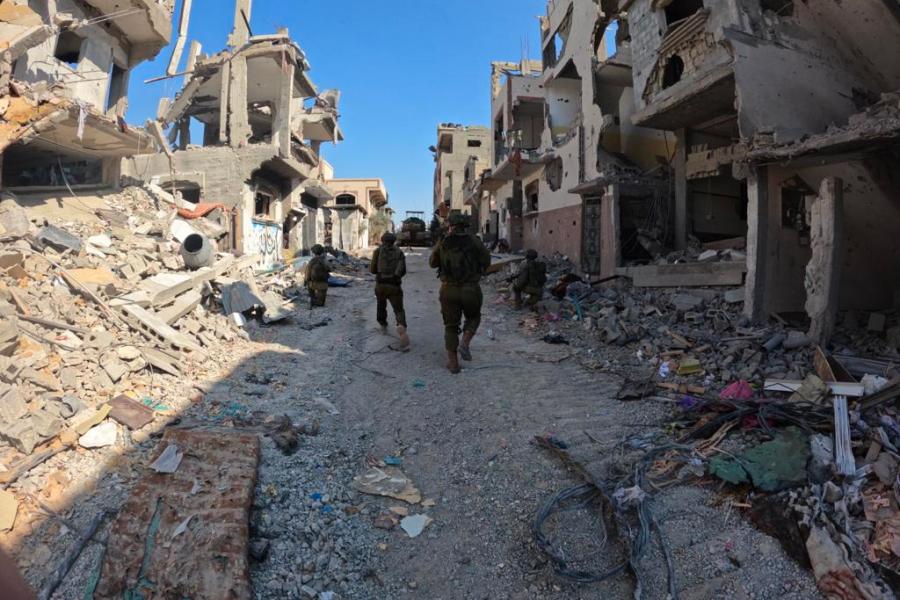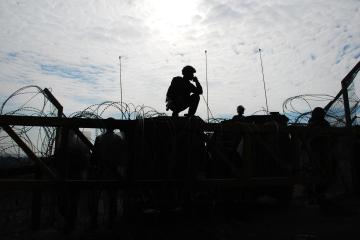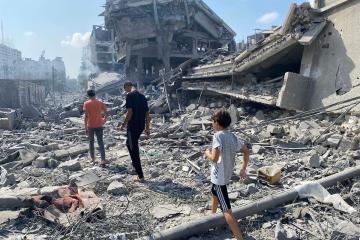The ongoing conflict between Israel and Hamas echoes an alarming trend in modern warfare—attacks on health care workers, humanitarian workers, and health care centers, as well as heightened vulnerability for civilians, two Johns Hopkins University experts said during a panel discussion on Tuesday, Nov. 14.
Paul Spiegel, director of the Johns Hopkins Center for Humanitarian Health, noted that "attacks on health care workers, humanitarian workers, and health care centers were not occurring many decades ago, but they're becoming more and more common."
They've taken center stage in the Israel-Hamas war, he said, where much of the recent fighting has occurred just outside the Al-Shifa Hospital in Gaza City. Civilians represent the largest number of casualties, and there is an untenable public health crisis in the region, Spiegel added.
Spiegel joined Leonard Rubenstein for a Q&A as part of the virtual Johns Hopkins Briefing series. The conversation—moderated by Lainie Rutkow, JHU's vice provost for interdisciplinary initiatives—examined how humanitarian health in the Middle East has been decimated by the ongoing fighting.
Spiegel is a Distinguished Professor of the Practice in the Department of International Health at the Johns Hopkins Bloomberg School of Public Health. He previously served as deputy director and chief of public health at the United Nations High Commissioner for Refugees.
Rubenstein is a Distinguished Professor of the Practice in the Bloomberg School's Department of Epidemiology and interim director of the Johns Hopkins Center for Public Health and Human Rights. He previously served as executive director and President of Physicians for Human Rights.
Notable topics covered included:
Humanitarian law
"Law itself could be a casualty of this war," Rubenstein warned, noting that both Israel and Hamas have likely flouted international law as dictated by the Geneva Convention.
Rubenstein defined humanitarian law as "impos[ing] specific obligations on combatants with one major purpose: to protect civilians, civilian objects and structures, and civilian health." In accordance with humanitarian law, military attacks must discriminate between civilians and military, he said.
Rubenstein said he sees no proof of compliance with humanitarian law from either side. Hamas has murdered civilians, taken them hostage, and launched rockets at neighborhoods at random, he said. Israel has taken few steps to minimize harm to civilians, Rubenstein said, by cutting fuel to Gaza and not assuring refugees shelter, food, and protected spaces where they can receive care.
Breaking international law leads to little punishment, he added. With no governing body enforcing compliance, violations are merely reported on and condemned by organizations like the United Nations, various NGOs, and the International Committee of the Red Cross.
Ultimately, enforcing the Geneva Convention relies on the unlikely scenario that militaries will self-police: "Fundamental protections are the responsibility of the combatants," Rubenstein said.
The toll on public health
While combatants who break international law may see few consequences, civilians and aid workers do, Spiegel said. The mental and physical strain on Gazans, Israelis, and aid workers is "incredibly serious," he said.
In what Spiegel called a "clear humanitarian emergency," Gaza's health care system has essentially collapsed. As of Nov. 7, the U.N. Office for the Coordination of Humanitarian Affairs said 40% of hospitals in Gaza have stopped functioning, meaning mortality rates are expected to rise in the coming weeks from illnesses and injuries that are normally treatable. With refugees packed into crowded camps and hospitals, respiratory infections are inevitable, Spiegel said. Lack of potable water could cause cholera outbreaks and is already causing diarrhea. Disrupted continuity of care means people with noncommunicable diseases, such as diabetes, cannot receive their medications. Additionally, he said, pregnant women have been unable to access care, and among the many thousands of casualties in Gaza, women and children have been killed in disproportionate numbers.
"Gaza lacks a humanitarian space where workers can be protected and do their job," Spiegel said. "That makes it extremely difficult for workers to carry out necessary functions—if they have sufficient supplies, which they do not."
Understandably, much of the discourse around public health has centered on Gaza, but Israel has also experienced destabilization, Rubenstein said. An estimated 150,000 Israelis living near the Gaza border have been displaced, a number that includes whole towns; 50,000 Israelis living near Lebanon have been forced to evacuate, as well. And then, of course, there are the events of Oct. 7, when Hamas slaughtered more than 1,200 people and took more than 240 as hostages.
"There has been an enormous amount of psychological trauma because it's a small country," Rubenstein said. "The horror of what happened on Oct. 7 is reverberating across the country because everyone knows somebody who knows somebody [who was affected]."
Spiegel added, "We need to take into account what's happening in Israel, as well as the echoes of WWII and the Holocaust that this has brought up."
Declining safety and mental health concerns extend beyond the Middle East, they said, as increased antisemitism and islamophobia emanating from the crisis have been felt around the globe.
The importance of accurate information
This conflict has also opened a new front in the war on information. "Both sides put out info, videos, and claims, and we have no way of verifying them," Rubenstein said.
In the search for reliable information, both experts caution strongly against relying on social media. Instead, they recommend looking to official sources, such as U.N. agencies, other governments, and reputable news outlets. "It's important to look at information and triangulate it from various sides, recognizing the biases from each side," Spiegel said. "In some cases, you have groups that either want to minimize or increase deaths or other things they're reporting."
Amidst contradictory reports from the Middle East, it may be somewhat relieving to know that precise statistics matter less in assessing humanitarian crises than larger statistical trends, Spiegel said: "In terms of the response, it doesn't matter if 10,000 or 12,000 people have been killed at this point—the numbers are so large and severe that it shouldn't make a difference in the acuity of the response that is needed."
In spite of a barrage of misinformation online, a clear picture of Gazan suffering has emerged. Rubenstein made it clear that "there is sufficient information from independent reporting and the news media that very serious harm is taking place and many thousands of civilians are getting killed, even if we don't know the exact number."
Posted in Voices+Opinion, Politics+Society











